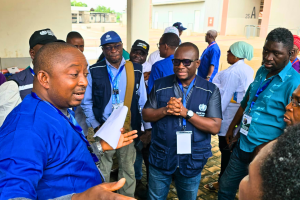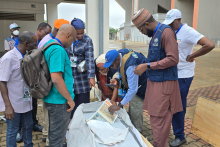Nigerian Government, WHO and partners Strengthen Cholera Preparedness nationwide
Abuja, Strengthening Frontline Capacity Nationwide
In response to a surge in cholera cases during the 2025 rainy season, the Nigeria Centre for Disease Control and Prevention (NCDC) and World Health Organization (WHO) in collaboration with UNICEF, WaterAid, and the International Federation of Red Cross and Red Crescent Societies (IFRC), have launched an initiative to strengthen cholera preparedness and response.
Over 150 frontline health workers from all 36 states and the Federal Capital Territory have been trained to improve early detection, reporting, and treatment of cholera. To ensure impact at the community level, state governments have cascaded these trainings to high-risk areas. In Bauchi State, with support from WaterAid, 40 community-level health workers across 12 high-burden LGAs received targeted training to enhance local response capacity.
“I feel better equipped now to detect cholera symptoms early and take immediate action,” said Yushau Muktari, a Disease Surveillance Officer in Bauchi. “This training will help us save lives.”
Cholera Cases Surge Amid Rainy Season
As of 28 July, Nigeria has recorded 4,700 cholera cases and 113 deaths (CFR: 2.4%), with outbreaks concentrated in flood-affected and displaced communities
Coordinated Action from Government and Partners
“We’re not just responding to outbreaks—we’re building systems to prevent the next one,” said Dr Jide Idris, Director General of NCDC. “With WHO’s support and donor contributions, we’re enhancing Nigeria’s ability to prepare for and respond to cholera more effectively.”
WHO’s Targeted Support Across States
WHO’s support includes:
• Pre-positioning cholera kits
• Strengthening surveillance systems
• Deploying rapid response teams
• Providing technical support in Zamfara, Adamawa, and Niger states
• Donating 7 cholera test kits and medical supplies for 200 patients
• Supplying 10,000 sachets of oral rehydration salts for community treatment
“Every cholera death is preventable,” said Ann Fortin, WHO Emergency Preparedness Response Lead in Nigeria. “To save lives, we must act faster—supporting health workers, improving coordination, and ensuring supplies reach those in need.”
A Roadmap to End Cholera by 2030
WHO emphasizes the need for a multi-sectoral, whole-of-government approach aligned with the Global Roadmap to End Cholera by 2030. This includes investing in water, sanitation, and hygiene (WASH), strengthening primary healthcare, and securing political and financial commitment.
Building Resilience Amid Climate Risks
“The risk of widespread outbreaks is real, especially as climate shocks intensify,” said Dr Alex Gasasira, Acting WHO Country Representative in Nigeria. “Thanks to the Government of Japan’s timely support, Nigeria is better positioned to protect its most vulnerable.”
WHO remains committed to supporting Nigeria in achieving its cholera control targets and safeguarding public health.

